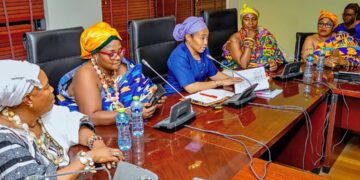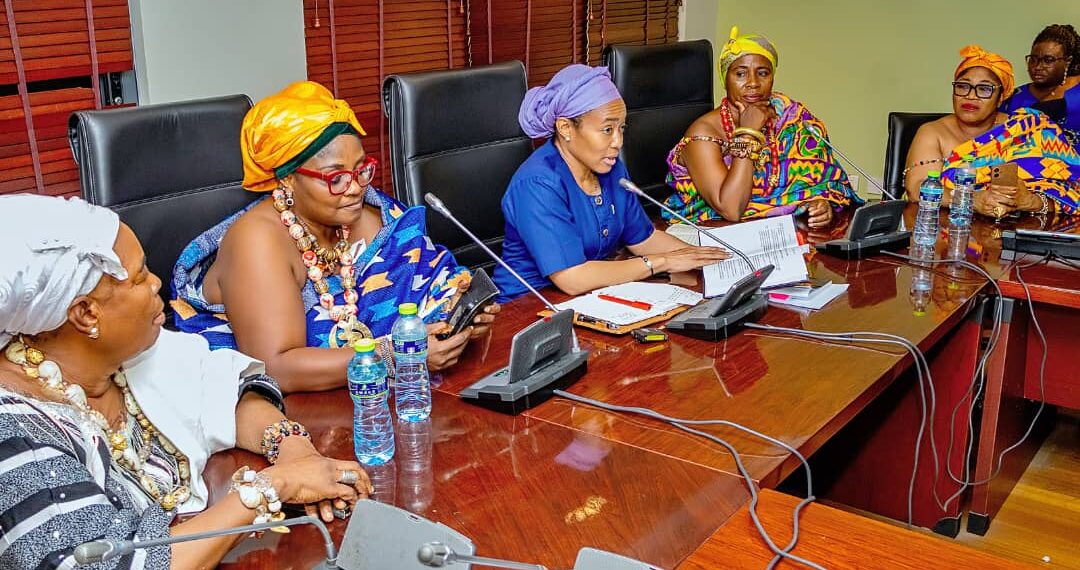Queenmothers from across Ghana, representing diverse traditional areas under the All Region Queenmothers Association, paid a courtesy call on Dr. Zanetor Agyeman-Rawlings, Chairperson of the Parliamentary Select Committee on Security and Intelligence, at the Parliament of Ghana yesterday. The high-level engagement offered a platform for the Queenmothers to voice critical concerns on national security, youth development, cultural integrity, and gender inclusion.
The delegation, which included representatives from the Northern, Savannah, Oti, Volta, Greater-Accra, and other regions, raised a range of pressing issues affecting their communities. Among the issues raised were the exclusion of Queenmothers from conflict resolution and peacebuilding structures, the rising use of drugs among the youth and the increasing incidents of violence in communities.
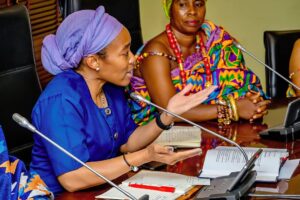
A concern echoed across the regions was the erosion of traditional values, particularly in the chieftaincy institution. Several Queenmothers lamented that lineage-based enstoolment, a hallmark of Ghanaian tradition, is being overshadowed by wealth-based selections, leading to tensions and undermining the legitimacy of traditional authority. Attempts by Queenmothers to speak against these trends, they said, often result in threats of destoolment.
A compelling example of their peacebuilding potential was shared in reference to the longstanding conflict between Nkonya and Alavanyo, a land dispute that has spanned more than a century. Queenmothers from both sides were instrumental in opening dialogue where traditional and political channels had previously failed. By leveraging their moral authority, communal trust, and emotional intelligence, the Queenmothers helped foster understanding, patience, and healing. Their continued involvement in reconciliation and confidence-building efforts has been credited with sustaining relative peace in the area in recent years. Their work stands as an example of how inclusive traditional leadership can reinforce national peacebuilding strategies.
Responding to these concerns, Dr. Zanetor Agyeman-Rawlings affirmed the relevance of the Queenmothers’ perspectives, both to local stability and national security. In her remarks, she noted that many of the conflicts in the country today are rooted in chieftaincy disputes. “If women are left out of decision-making when it comes to peace conversations, you will not truly achieve what you are looking for,” she stressed.
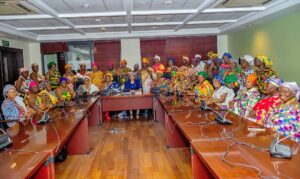
Dr. Agyeman-Rawlings referenced United Nations Security Council Resolution 1325, adopted nearly two decades ago, which affirms the critical role women play in the prevention and resolution of conflicts, peace negotiations, and peacebuilding. “Your presence here today is not just relevant to your individual jurisdictions but to Ghana’s national security,” she told the Queenmothers. “You represent an important component of Ghana’s traditional leadership and your insights are invaluable to national security discourse.”
Some of the Queenmothers in attendance also serve on regional Peace Councils, a fact which underscored their readiness to be more involved in formal national peacebuilding efforts. They called on Dr. Agyeman-Rawlings to champion their inclusion in national decision-making spaces, particularly in chieftaincy arbitration processes and investigations into communal disputes.
With reference to the challenge on substance abuse, they said: “Some of our communities are losing their youth to substance abuse, for example, marijuana,” a Queenmother from the Northern Region lamented. “Our young people who are supposed to be the future leaders of our generation are going down. We see it, but our hands are tied and we don’t know what to say. Please reinforce our police stations so that they can be of assistance to intervene in this issue.” Another Queenmother called for more proactive economic engagement of young people. “We need to keep the youth busy. If we create opportunities and jobs for them, they will stay away from such harmful habits,” she said.
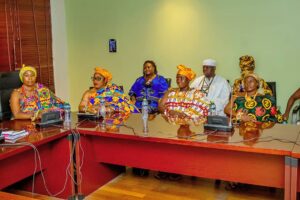 The Queenmothers appealed for economic empowerment not only for the youth but also for themselves as traditional female leaders. “Empower the Queenmothers economically so that we can also empower the youth in our jurisdictions,” they urged. In line with this, the delegation expressed hopeful anticipation for the establishment of the long-promised Women’s Bank, a government initiative intended to provide financial support and tailored services to women entrepreneurs and leaders. “We are all looking forward to the Women’s Bank being set up so that women across the country can access the resources they need to uplift their communities,” one Queenmother added.
The Queenmothers appealed for economic empowerment not only for the youth but also for themselves as traditional female leaders. “Empower the Queenmothers economically so that we can also empower the youth in our jurisdictions,” they urged. In line with this, the delegation expressed hopeful anticipation for the establishment of the long-promised Women’s Bank, a government initiative intended to provide financial support and tailored services to women entrepreneurs and leaders. “We are all looking forward to the Women’s Bank being set up so that women across the country can access the resources they need to uplift their communities,” one Queenmother added.
Healthcare infrastructure in rural and peri-urban communities also featured prominently in the discussions. The Queenmothers called for the revamping of local health facilities, especially to cater to the needs of pregnant women and young children. “Our women are giving birth without proper care. We need well-functioning clinics with trained staff and the necessary equipment,” they said.
In response, Dr. Agyeman-Rawlings pledged her support and cited Article 277 of the 1992 Constitution of Ghana, which defines a chief not by gender, but by their status and role in the community. “A chief, according to our Constitution, is not necessarily a man. Queenmothers are chiefs too, and your authority must be respected as such,” she affirmed. While emphasising the need for greater inclusion of women in national development and peace processes, Dr. Agyeman-Rawlings also underscored the importance of partnership between men and women. “There should be equity and eventually equality. That is how we move forward as a nation.”
The Queenmothers left the meeting encouraged, with a renewed commitment to work with Parliament and other stakeholders to ensure that traditional female leadership is recognised, respected, and integrated into the country’s peace and security architecture.
The engagement marks a significant step forward in acknowledging the intersection of tradition and governance, and the indispensable role of women in building a safer, more inclusive Ghana.
